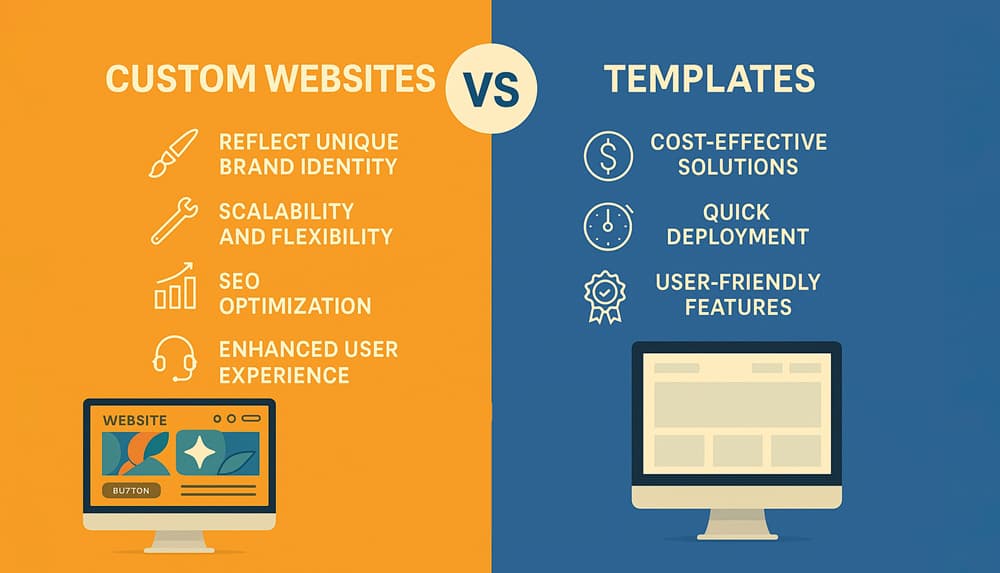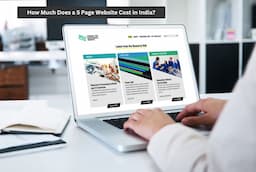Custom Vs. Template Website Design: Which one is The Right Choice

In 2025, when the digital world is fast developing, the question of strong online presence is not negotiable at all. The initial question brought before most entrepreneurs is a choice between a custom-designed personal page or based on an already made one. Both are clearly beneficial, and both are clearly problematic, and so the solution (which is the right solution) is not necessarily the same across the board, but it does depend on what you hope to accomplish and with what funds, and with how much technical skill, and what future you see lying ahead of you.
This comprehensive guide will analyze the intricacies of custom vs. template web design, enabling you to make a well-informed web design choice that fits your strategic goals, and, in particular, within the context of an exciting digital landscape in India.
Learning the Foundations
Template Web Design: This method is the application of pre-existing pattern or arrangement which is to be the basis of your web site. The number of templates is huge on such platforms as WordPress (themes), Shopify, Wix, Squarespace, and others. You select a template, format the content on it (type, pictures, colors, font styles), and more usually, drag and drop content to suit your requirements. No or little knowledge of coding is normally needed to do simple configuration.
Custom Web design: This is a more unique strategy where professional web designers and website developers actually set up your website literally on a foundation, depending entirely on your individual needs. All the aspects, including the user interface (UI) and user experience (UX), backend functionality and database integration are developed and implemented to your specifications. This is usually through shared efforts with a professional website design company in India.
Template Website Design: The "Quick Start" Alternative
Advantages:
Affordability: This is the biggest attraction, in most cases. Templates are much more affordable compared to custom ones.
Cost in India (2025): A simple template website for a small business or personal website could cost between ₹10,000 - ₹30,000, while a small e-commerce template-based site would cost between ₹25,000 - ₹75,000. These costs usually involve basic setup, content integration, and occasionally first-year hosting/domain.
Speed to Market: You are able to put a website up much quicker. If you are ready to go with your content, a template site can be running in days or weeks, compared to months for custom solutions. That is perfect for startups or companies with an urgent need for an online presence.
Ease of Use: Most template websites are geared towards non-technical individuals, with easy drag-and-drop editors and visual builders. This allows business owners to update and control their content without depending continually on website developers.
Pre-built Functionality: Templates usually include popular features and plugins (e.g., contact forms, image galleries, basic SEO functionality, e-commerce integrations) already pre-built, saving development time.
Community Support & Updates: Popular template sites boast huge communities and frequently provide regular updates, security patches, and comprehensive documentation.
Drawbacks:
Lack of Uniqueness ("Cookie-Cutter" Appearance): This is the biggest drawback. With so many businesses using similar templates, it's difficult to be different. Your site may appear generic or too similar to others, inhibiting brand identity.
Limited Customization: While templates offer some flexibility, they often restrict true customization. You're confined to the template's predefined structure and design elements. Significant changes often require complex coding, defeating the purpose of a template.
Bloated Code & Slower Performance: Templates are created to support many users, so they tend to have excess features and code that serve no purpose and slow down your site's load time. This harms the user experience and SEO.
Scalability Problems: The larger your business gets, the more your requirements may change than a template can manage effectively. The addition of sophisticated custom features or integrations may grow to be cumbersome, costly, or even impossible without a full redesign.
SEO Restriction: Most templates are "SEO-friendly," but they may not provide the ability to control and have access to advanced optimization strategies that a custom site might provide, limiting your search engine ranking capabilities.
Security Threats: Popular templates become popular targets for hackers. Developers issue patches while you struggle to keep up with updates and verify that all plugins are secure.
Dependence on Platform: You become locked into the platform's environment, which may have limitations or pricing models of its own.
Custom Website Design: The "Tailor-Made" Solution
Advantages:
Distinct Brand Identity & Differentiation: Your custom website is designed to mirror your brand's distinct vision, values, and personality. It enables you to be recognized in a saturated marketplace and leave a lasting impression, cementing your brand image. This is essential in cultivating trust and recognition.
Custom User Experience (UX): Experienced website designers in India can design a smart and extremely optimized user experience just for your desired audience. Each interaction, navigation sequence, and content display is created to optimize user experience and conversions.
Total Flexibility & Control: You are in full control of all aspects of your website – look, functionality, features, and integrations. This allows you to develop exactly what you want, without compromise.
Scalability: Handcrafted websites are designed with the future in mind. As your company grows, new features, integrations, and content can be easily implemented without overhahauling the entire site. This makes it an investment for the long haul.
Optimized Performance & SEO: Clean, optimized code by website developers means the site loads quickly and performs well. This gives you the ability to optimize every piece of code according to search engine best practices, gaining an advantage in organic search rankings.
Increased Security: Custom websites can use effective security practices that are specific to your needs, leaving them less exposed to general attacks targeted at widely used templates.
Ownership and Portability: You have complete ownership of the code and design, with the freedom to host it wherever you want or move it if necessary.
Drawbacks:
Increased Upfront Cost: It is the main hindrance for most. Custom sites demand huge investments in design, development, and testing.
Cost in India (2025): For a custom business site with professional design and intermediate-level functionality, anticipate an investment of ₹50,000 to ₹3,00,000+. For a custom e-commerce site with sophisticated features (inventory management, CRM integration, personalized user experience, unique payment flows), prices can vary from ₹1,50,000 to ₹20,00,000 or more, depending on complexity and the website design company in India you select. Solutions at the enterprise level can cost lakhs and crores.
Longer Development Time: Custom website designing, development, and testing takes time, which may be weeks or months, or even more for complicated sites.
Requires Professional Expertise: You'll have to engage professional expert website designers and website developers or a complete-service website design firm in India. This involves depending upon outside expertise for primary build and maybe on an ongoing basis for maintenance.
Higher Maintenance Costs (Potentially): Although you are the owner of the code, having a bespoke site (upgrades, bug fixes, security patches) may mean ongoing work with your development team. Yet, this tends to mean more focused and personalized support.
Higher Initial Planning Effort: The planning and discovery period for a bespoke site is considerable, with transparent communication and precise requirements expected from the client.
Which One is The Right Choice for You?
The choice is based on a thoughtful evaluation of your business:
Select a Template Website if:
You have a tight budget: You must go online fast and inexpensively.
You must have a website right away: Speed to market is most important to you.
Your business is fairly typical: Your requirements fit nicely with typical website features (e.g., a straightforward blog, a minor portfolio, an ordinary information site, or a small online store with standard products).
You have limited technical capabilities: You do not wish to code your website content yourself.
Brand uniqueness is not your key differentiator (yet): Functionality trumps entirely unique looks in your case.
You are experimenting with a new business concept: An MVP (Minimum Viable Product) website may prove enough for initial validation.
Select a Custom Website if:
You place high value on brand identity: You desire a distinctive, memorable online presence that accurately portrays your brand's unique personality.
You have special, complicated functionality: Your company needs custom features or integrations not found in the off-the-shelf package (e.g., unique booking systems, special calculators, particular database integrations, complex e-commerce logic, AI integration).
User experience matters: You wish to create a highly optimized, intuitive path exactly suited for your intended users' requirements and behaviors.
You want long-term scalability and expansion: Your company is going to change, and you want a site that can evolve and grow with it.
You budget properly: You realize the investment needed for a high-end, custom solution.
You want leading SEO performance: You want fine-grained control over technical SEO aspects.
You need high-security level: Your site processes sensitive information or major transactions.
You want to collaborate with professional website developers and website designers: You prefer expert advice and a team-based method.
The Hybrid Method
At other times, the ideal solution is a combination of both. You may begin by using a well-selected, extremely customizable template (such as a solid WordPress theme or a Shopify theme) and then commission professional web developers to create custom functionalities or design pieces on top of it. This gives a balance between cost, speed, and customization. Quite a number of website design company in India provide this hybrid service, using platforms while supplementing with bespoke code where required.
Finding the Right Partner in India
Even if you choose a custom build or a highly customized template, finding the right partner from a competent website development company in India is of prime importance. India's large talent pool is made up of competent and cost-effective professional website designers and website developers. When you choose a partner:
Check their portfolio: Do their previous projects meet your vision and quality standards?
Verify reviews and feedback: What is their experience saying regarding their professionalism, communication, and delivery?
Inquire about their process: Do they follow a defined design and development process?
Review their expertise: Are they experts in your business or the exact platform/technology you wish to use?
Define pricing and support: Request an in-depth quote and determine what's included in maintenance, updates, and support after launch.
Communication is paramount: Make sure they grasp your business objectives and can explain them in your language of choice.
Conclusion
The decision to use custom or template web design is a strategic one with profound implications for your brand, your budget, and future expansion. While templates provide a cheap and quick entry point, custom designs offer unbeatable individuality, adaptability, and long-term flexibility.
In 2025, with growing digital competition and high-end user expectations, it will pay the most dividends in the long run to invest in a solution that best addresses your specific business requirements and offers a better user experience. Take the time to evaluate your priorities, and don't mind seeking the advice of professional website designers and an established website design firm in India to lead you to the ideal digital house for your business.
Recent Blogs

How Much Does a 5 Page Website Cost in India?

Importance of Good Quality Images in a Website Design
